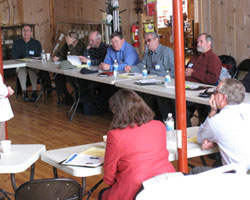Competing Effectively in the Global Knowledge Economy
MSU Center for Community and Economic Development Partners with Regional Planners in Northern Michigan and Eastern Upper Peninsula to Identify Strategic Actions
With the shift from a manufacturing economy to a knowledge economy, individuals, organizations, and communities find themselves struggling to envision new livelihoods in an increasingly competitive global economy, and improve the quality of community life in an atmosphere of diminishing public resources. Continued high rates of unemployment, downsizing of automobile manufacturing plants, decreases in levels of home ownership (and increases in delinquencies and foreclosures), declines in personal wealth (and increased rates of personal bankruptcies), and steady out-migration of Michigan's youth pose extreme challenges for the future viability of Michigan's large and small communities.

MSU's Center for Community and Economic Development (CCED) plays an active role in collaborating with communities to solve real-world issues associated with economic growth and social equity. One specific project recently nominated for a national award involved a two-year effort to develop innovative economic development tools for three northern Michigan regions.
The Northern Michigan and Eastern Upper Peninsula Knowledge Economy Strategies Project was funded with a grant from the U.S. Department of Commerce, Economic Development Administration, as well as participation from several MSU units. MSU faculty and staff worked with three regional partners, covering 21 counties in northern Michigan and the UP: the Northwest Michigan Council of Governments, the Northeast Michigan Council of Governments, and the Eastern Upper Peninsula Regional Planning and Development Commission.
Research, Collaboration, and Results
"One of our roles was to identify and provide access to the right combination of university resources, and other resources, for our regional partners that were accessible and responsive," said Dr. Rex LaMore, CCED director.
The project team created and identified tools to transform regional planners' Comprehensive Economic Development Strategies, and empower them to compete more effectively in the global knowledge economy. Mature companies as well as entrepreneurial start-ups require workers who are better educated and able to use knowledge to navigate the rapid technological changes facing businesses today.
The project was introduced to stakeholders with knowledge economy orientation sessions in each Economic Development District (EDD). Regional planners identified current strengths, weaknesses, and opportunities in their respective regions based on the content of the sessions.
Initiating regional collaborative learning plans (co-learning plans), the team worked to shape a change in thinking about economic development by regional leaders and stakeholders that included visionary innovation, entrepreneurial drive, and highly-motivated learning and knowledge.
Plan of Action
The MSU project team and planners from each EDD worked on a co-learning plan of action that included research and suggested strategies to support innovative regional planning and the creation of well-paid jobs. Faculty, staff, and students assisted with capacity building and training in data collection, and analysis methods.
Data gathering and analysis was a key component of the project. One of the principal project objectives was to identify meaningful measures and useful indicators of regional knowledge economy conditions. The development of a set of regional knowledge economy indicators contributed to planners and stakeholders having the capacity to prioritize projects more effectively and tracking the results of implemented strategies.
"The volume of information produced by MSU benefits our region now and for years to come," said Jeff Hagan, executive director of the Eastern Upper Peninsula Regional Planning and Development Commission. "The data mining goes beyond anything we have collected in the past. Where we may have been working with 25 tables of information, we now have 73 tables. Firmer benchmarks allow us to track important changes in our region and adjust our strategies accordingly."
The co-learning white papers addressed seven critical topics: broadband policy recommendations for local governments; criteria for prioritizing projects in transforming comprehensive economic development strategies; identification of exporting companies; talent cultivation and retention; capital access and investment strategies for the region; quantifying seasonal residents who become permanent residents in northern Michigan communities; and promotion of ecotourism.
National Recognition
The project team conducted a national webinar attracting an audience of over 200 that coincided with the launch of the project website, knowledgeplanning.org. Featuring collaborative regional strategies and innovation; talent development, retention, attraction, and re-attraction; entrepreneurial resources; and, exporting opportunities and resources, the website provides valuable tools and resources for regional and community planners, planning students, and area residents.
The project was recognized with an "Awards of Excellence Finalist" distinction by the University Economic Development Association during its annual meeting in November 2010.
"It is an honor to be recognized for our multi-disciplinary approach and collaborative learning model involving both researchers and community participants," said J.D. Snyder, project director.
In addition to the U.S. EDA, funders included the Michigan State University Institute for Public Policy and Social Research, Office of the Provost, College of Agriculture and Natural Resources, and MSU Extension. The project team included faculty, staff, and students from the Center for Community and Economic Development, the Department of Geography, and the School of Planning, Design, and Construction.
- Written by Carla Hills, University Outreach and Engagement
- Photographs courtesy of J.D. Snyder, Center for Community and Economic Development